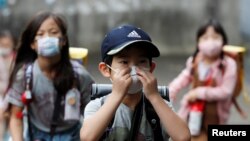ອົງການກອງທຶນເດັກສາກົນຂອງ ສະຫະປະຊາຊາດ ຫຼື UNICEF ໄດ້ກ່າວໃນ ວັນອັງຄານວານນີ້ວ່າ ການປິດສະຖານທີ່ການສຶກສາ ຍ້ອນໂຣກລະບາດໂຄວິດ- 19 ໄດ້ສົ່ງຜົນໃຫ້ເດັກນ້ອຍອະນຸບານຢ່າງໜ້ອຍ 40 ລ້ານຄົນຂາດການຮໍ່າຮຽນ ແລະ ການພັດທະນາ.
ຜູ້ອຳນວຍການໃຫຍ່ຂອງອົງການ UNICEF ທ່ານນາງ ເຮັນຣີເອັດຕາ ຟໍ ໄດ້ ກ່າວໃນຖະແຫຼງການສະບັບນຶ່ງວ່າ “ການລົບກວນດ້ານການສຶກສາທີ່ມີສາເຫດ ມາຈາກໂຣກລະບາດ ໂຄວິດ-19 ແມ່ນກຳລັງປ້ອງກັນບໍ່ໃຫ້ເດັກນ້ອຍໄດ້ເລີ່ມ ຮັບການສຶກສາທີ່ດີທີ່ສຸດເທົ່າທີ່ເປັນໄປໄດ້. ສະຖານທີ່ລ້ຽງເດັກ ແລະ ໂຮງຮຽນ ອະນຸບານ ຈະສ້າງພື້ນຖານເຊິ່ງທຸກໆແງ່ມຸມຂອງການພັດທະນາຂອງເດັກນ້ອຍ ເພິ່ງພາອາໄສ. ໂຣກລະບາດແມ່ນກຳລັງເຮັດໃຫ້ພື້ນຖານທີ່ວ່ານັ້ນ ຕົກຢູ່ພາຍ ໃຕ້ໄພຂົ່ມຂູ່ທີ່ຮ້າຍແຮງ.”
ລາຍງານການຄົ້ນຄວ້າສັ້ນ, ທີ່ຜະລິດຂຶ້ນໂດຍຫ້ອງການຄົ້ນຄວ້າຂອງອົງການ UNICEF, ໄດ້ເພັ່ງເລັງໃສ່ສະຖານະພາບຂອງການສຶກສາຂອງເດັກນ້ອຍອະນຸ ບານ ແລະ ຜົນກະທົບຂອງໂຣກລະບາດຕໍ່ເຂົາເຈົ້າ.
ອົງການ UNICEF ໄດ້ກ່າວໃນຖະແຫຼງການສະບັບນຶ່ງວ່າ ລາຍງານໄດ້ພົບວ່າ ເດັກນ້ອຍປະມານ 40 ເປີເຊັນລະຫວ່າງ 3 ແລະ 5 ປີ ໃນ 54 ປະເທດທີ່ມີ ລາຍໄດ້ຕໍ່າ ແລະ ປານກາງ “ແມ່ນບໍ່ໄດ້ຮັບການກະຕຸ້ນທັກສະການປັບຕົວເຂົ້າ ໃນສັງຄົມ ແລະ ຄວາມຮູ້ຄວາມເຂົ້າໃຈ ຈາກຜູ້ໃຫຍ່ຄົນໃດຢູ່ໃນຄອບຄົວຂອງ ເຂົາເຈົ້າ.”
ໃນການປະເຊີນກັບທາງເລືອກການເຂົ້າຮຽນຊັ້ນອະນຸບານ, ສະຖານທີ່ລ້ຽງເດັກ ແລະ ການປົກປ້ອງໃນສັງຄົມອື່ນໆໜ້ອຍລົງນັ້ນ, ພໍ່ແມ່ຜູ້ເຮັດວຽກທີ່ທຸກຍາກ ຫຼາຍຄົນ, ໂດຍສະເພາະແມ່ນແມ່, ໄດ້ຖືກບັງຄັບໃຫ້ພາລູກຂອງເຂົາເຈົ້າໄປເຮັດ ວຽກນຳ.
ລາຍງານໄດ້ກ່າວວ່າ “ພໍ່ແມ່ຫຼາຍຄົນໄດ້ຕິດກັບດັກຢູ່ໃນການຈ້າງງານທີ່ບໍ່ສາ ມາດເຊື່ອຖືໄດ້ ແລະ ຄ່າຈ້າງຕໍ່ານີ້, ທີ່ປະກອບສ່ວນເຂົ້າໃນວົງຈອນຄວາມ ທຸກຍາກລະຫວ່າງຫຼາຍລຸ້ນຄົນ.
ໃນ ສະຫະລັດ, ຜູ້ປົກຄອງລັດ ນິວ ຢອກ ທ່ານ ແອນດຣູ ຄູໂອໂມ ໄດ້ຂຽນຂໍ້ ຄວາມໃນທວິດເຕີໃນວັນອັງຄານວານນີ້ວ່າ 31 ຈາກ 50 ລັດຂອງ ສະຫະລັດ ໃນເວລານີ້ແມ່ນຢູ່ໃນລາຍຊື່ທີ່ຮຽກຮ້ອງໃຫ້ປະຊາຊົນທີ່ເດີນທາງຈາກລັດທີ່ວ່ານັ້ນ ໄປ ນິວ ຢອກ ຕ້ອງກັກຕົວກວດໂຣກ ເປັນເວລາ 14 ວັນ.
ໃນຂະນະດຽວກັນ, ດ້ວຍການຢືນຢັນຫຼາຍກວ່າ 14 ລ້ານ 7 ແສນກໍລະນີຂອງ ໄວຣັສໂຄໂຣນາສາຍພັນໃໝ່ ແລະ ການເສຍຊີວິດເກືອບ 611,000 ຄົນນັ້ນ, ບັນດານັກຄົ້ນຄວ້າໄດ້ລາຍງານຄວາມກ້າວໜ້າ ກ່ຽວກັບ ການແຂ່ງຂັນເພື່ອພັດ ທະນາຢາວັກຊີນທີ່ປອດໄພ ແລະ ມີປະສິດທິຜົນຕໍ່ເຊື້ອໂຣກດັ່ງກ່າວ.
The United Nations International Children’s Fund said Tuesday that the closing of educational facilities due to the COVID-19 pandemic has resulted in at least 40 million preschool students worldwide missing out on learning and development.
“Education disruptions caused by the COVID-19 pandemic are preventing children from getting their education off to the best possible start,” UNICEF Executive Director Henrietta Fore said in a statement. “Child care and early childhood education build a foundation upon which every aspect of children’s development relies. The pandemic is putting that foundation under serious threat.”
The research brief, produced by UNICEF’s office of research, focused on the state of early childhood education and child care and the impact the pandemic is having on them.
The report found that an estimated 40% of children between 3 and 5 years old in 54 low- and middle-income countries “were not receiving social-emotional and cognitive stimulation from any adult in their household,” UNICEF said in a statement.
Facing few early education, child care and other social protection options, many working poor parents, particularly mothers, have been forced to bring their children to work.
“Many parents become trapped in this unreliable, poorly paid employment, contributing to intergenerational cycles of poverty, the report said.
In the U.S., New York Gov. Andrew Cuomo tweeted Tuesday that 31 of the 50 U.S. states are now on a list that requires people traveling from those states to New York to self-quarantine for 14 days.
[[ https://twitter.com/NYGovCuomo/status/1285628493573902344 ]]
Meanwhile, with over 14.7 million confirmed novel coronavirus cases and nearly 611,000 fatalities, researchers are reporting progress on the race to develop a safe and effective vaccine against the disease.
Two experimental vaccines — one developed in a joint venture between Britain’s Oxford University and British-Swedish drugmaker AstraZeneca, the other by Chinese biotech firm CanSino Biologics — have produced strong immune responses in late-stage human trials, according to two peer-reviewed studies published Monday in the British medical journal The Lancet.
U.S. drug maker Pfizer and its German partner BioNTech also reported positive progress Monday on their vaccine candidate.
The vaccine developed by the joint Oxford-AstraZeneca partnership is receiving the most attention, with the company having signed agreements with many governments to supply its vaccine if it is proved to be effective and granted regulatory approval. The company has already committed to making 2 billion doses.
According to The New York Times, the doses have been administered to more than 10,000 volunteers in Britain, Brazil and South Africa, with 30,000 participants in the United States set to receive the experimental vaccine next week.
Monday’s news comes a week after U.S.-based biotech firm Moderna announced a vaccine developed by researchers at the National Institute of Allergy and Infectious Disease had also produced strong immune responses in its late-stage human trials, although it came with mild or moderate side effects such as fatigue, headaches, chills and muscle aches.
But Dr. Peter Hotez, the dean of tropical medicine at Baylor College of Medicine, told CNN Monday that “the first vaccines may not be our best vaccines.” Hotez said it will probably take a year “to accumulate all the data showing the vaccines actually work, as well as that they’re safe.”
Meanwhile, European Union leaders reached an agreement early Tuesday on a $2.1 trillion budget and coronavirus relief package.
The agreement includes $857 billion in coronavirus funding that will be issued as loans and grants to the hardest-hit countries.
It came after negotiations stretched on for four days and nights, well beyond what was expected. A main sticking point was a divide between a group of five richer countries in the north, including the Netherlands and Austria, that advocated a cut in the original proposal of $572 billion in grants along with stricter spending controls, while other countries such as Spain and Italy sought to keep such restrictions to a minimum.
The final agreement included a compromise of $446 billion in grants.
During an Oval Office meeting with Republican lawmakers on Monday about a new coronavirus financial rescue package, President Donald Trump announced that he will resume the daily press briefings of his coronavirus task force, beginning Tuesday.
The president led the briefings over the course of several weeks in the early days of pandemic, but ended them in April after he was widely criticized for an offhand suggestion that doctors could inject bleach into COVID-19 patients to counteract the disease.
Trump also used the briefings to tout the use of hydroxychloroquine as a treatment, despite medical experts’ warnings that the drug was ineffective and possibly has deadly side effects.
The return of the daily briefings comes as the U.S. has a world-leading 3.8 million confirmed COVID-19 infections and the world’s highest death toll, more than 141,000, according to the Johns Hopkins University Coronavirus Research Center.
[[ https://coronavirus.jhu.edu/map.html ]]
After weeks of downplaying the need for Americans to wear masks as an effective means to prevent spreading the virus, Trump also tweeted a photo of himself wearing a mask. He wrote that “many people say that it is Patriotic to wear a face mask when you can’t socially distance. There is nobody more Patriotic than me, your favorite President!” [[ https://twitter.com/realDonaldTrump/status/1285299379746811915 ]]





